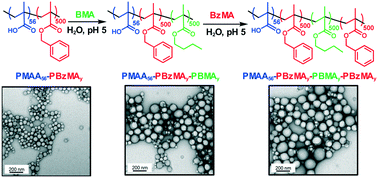当前位置:
X-MOL 学术
›
React. Chem. Eng.
›
论文详情
Our official English website, www.x-mol.net, welcomes your
feedback! (Note: you will need to create a separate account there.)
Optimization of the high-throughput synthesis of multiblock copolymer nanoparticles in aqueous media via polymerization-induced self-assembly†
Reaction Chemistry & Engineering ( IF 3.4 ) Pub Date : 2018-06-15 00:00:00 , DOI: 10.1039/c8re00066b Amy A. Cockram 1, 2, 3, 4 , Robert D. Bradley 4, 5 , Sylvie A. Lynch 4, 5 , Patricia C. D. Fleming 4, 5 , Neal S. J. Williams 4, 5 , Martin W. Murray 4, 5 , Simon N. Emmett 4, 5 , Steven P. Armes 1, 2, 3, 4
Reaction Chemistry & Engineering ( IF 3.4 ) Pub Date : 2018-06-15 00:00:00 , DOI: 10.1039/c8re00066b Amy A. Cockram 1, 2, 3, 4 , Robert D. Bradley 4, 5 , Sylvie A. Lynch 4, 5 , Patricia C. D. Fleming 4, 5 , Neal S. J. Williams 4, 5 , Martin W. Murray 4, 5 , Simon N. Emmett 4, 5 , Steven P. Armes 1, 2, 3, 4
Affiliation

|
Over the past fifteen years or so, polymerization-induced self-assembly (PISA) has become widely recognized as a powerful and versatile platform technology for the synthesis of a wide range of block copolymer nanoparticles of controlled size, shape and surface chemistry. In the present study, we report that PISA formulations are sufficiently robust to enable high-throughput experiments using a commercial synthesis robot (Chemspeed Autoplant A100). More specifically, we use reversible addition-fragmentation chain transfer (RAFT) aqueous emulsion polymerization of either n-butyl methacrylate and/or benzyl methacrylate to prepare various examples of methacrylic multiblock copolymer nanoparticles using a poly(methacrylic acid) stabilizer block. Adequate stirring is essential to generate sufficiently small monomer droplets for such heterogeneous polymerizations to proceed efficiently. Good reproducibility can be achieved under such conditions, with well-defined spherical morphologies being obtained at up to 45% w/w solids. GPC studies indicate high blocking efficiencies but relatively broad molecular weight distributions (Mw/Mn = 1.36–1.85), suggesting well-defined (albeit rather polydisperse) block copolymer chains. These preliminary studies provide a sound basis for high-throughput screening of RAFT-mediated PISA formulations, which is likely to be required for commercialization of this technology. Our results indicate that methacrylic PISA formulations enable the synthesis of diblock and triblock copolymer nanoparticles in high overall yield (94–99%) within 1–3 h at 70 °C. However, tetrablocks suffer from incomplete conversions (87–96% within 5 h) and hence most likely represent the upper limit for this approach.
中文翻译:

通过聚合诱导的自组装, 优化水性介质中多嵌段共聚物纳米粒子的高通量合成†
在过去的十五年左右的时间里,聚合诱导的自组装(PISA)已被公认为是一种功能强大且用途广泛的平台技术,用于合成各种尺寸,形状和表面化学性质可控的嵌段共聚物纳米粒子。在本研究中,我们报告说PISA配方足够坚固,可以使用商业合成机器人(Chemspeed Autoplant A100)进行高通量实验。更具体地,我们使用可逆加成-断裂链转移(RAFT)的任一水性乳液聚合Ñ甲基丙烯酸丁酯和/或甲基丙烯酸苄酯,以使用聚(甲基丙烯酸)稳定剂嵌段制备甲基丙烯酸多嵌段共聚物纳米颗粒的各种实例。充分搅拌对于产生足够小的单体液滴对于使这种非均相聚合有效地进行是必不可少的。在这样的条件下可以实现良好的重现性,其中固含量高达45%w / w时可以获得明确的球形形态。GPC研究表明,封闭效率很高,但分子量分布相对较宽(M w / M n= 1.36–1.85),表明嵌段共聚物链定义明确(尽管相当分散)。这些初步研究为高通量筛选RAFT介导的PISA制剂提供了良好的基础,而该技术可能需要对该技术进行商业化。我们的结果表明,甲基丙烯酸PISA配方可在70°C的1-3 h内以高总产率(94–99%)合成二嵌段和三嵌段共聚物纳米颗粒。但是,四嵌段化合物的转化不完全(在5小时内转化率为87-96%),因此很可能代表了这种方法的上限。
更新日期:2018-06-15
中文翻译:

通过聚合诱导的自组装, 优化水性介质中多嵌段共聚物纳米粒子的高通量合成†
在过去的十五年左右的时间里,聚合诱导的自组装(PISA)已被公认为是一种功能强大且用途广泛的平台技术,用于合成各种尺寸,形状和表面化学性质可控的嵌段共聚物纳米粒子。在本研究中,我们报告说PISA配方足够坚固,可以使用商业合成机器人(Chemspeed Autoplant A100)进行高通量实验。更具体地,我们使用可逆加成-断裂链转移(RAFT)的任一水性乳液聚合Ñ甲基丙烯酸丁酯和/或甲基丙烯酸苄酯,以使用聚(甲基丙烯酸)稳定剂嵌段制备甲基丙烯酸多嵌段共聚物纳米颗粒的各种实例。充分搅拌对于产生足够小的单体液滴对于使这种非均相聚合有效地进行是必不可少的。在这样的条件下可以实现良好的重现性,其中固含量高达45%w / w时可以获得明确的球形形态。GPC研究表明,封闭效率很高,但分子量分布相对较宽(M w / M n= 1.36–1.85),表明嵌段共聚物链定义明确(尽管相当分散)。这些初步研究为高通量筛选RAFT介导的PISA制剂提供了良好的基础,而该技术可能需要对该技术进行商业化。我们的结果表明,甲基丙烯酸PISA配方可在70°C的1-3 h内以高总产率(94–99%)合成二嵌段和三嵌段共聚物纳米颗粒。但是,四嵌段化合物的转化不完全(在5小时内转化率为87-96%),因此很可能代表了这种方法的上限。











































 京公网安备 11010802027423号
京公网安备 11010802027423号